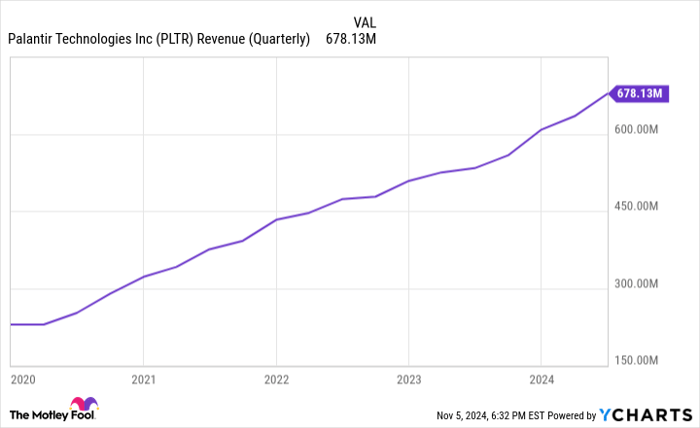Where Will Palantir Stock Be in 3 Years?

Just weeks after joining the S&P 500, Palantir (NYSE: PLTR) impressed investors with its strong third quarter earnings report, sending shares up by 20%. CEO Alex Karp attributed this success to an "unwavering" demand for its artificial intelligence (AI) products, a promising sign not just for Palantir, but for the entire AI industry. The company is demonstrating the real-world value of AI, helping make the case that Silicon Valley's enormous AI-focused capital expenditures are justified.
Let's take a look at the state of Palantir and where its stock might be three years from now.
Palantir's Q3 was a smashing success
Palantir exceeded already high expectations from Wall Street. The company brought in $725 million for the quarter -- handily beating the analyst average of $703 million -- representing more than 27% growth from a year ago.
Revenue has been steadily climbing for years, but a 27% hike is by far the largest since the middle of 2022.
PLTR Revenue (Quarterly) data by YCharts
The real kicker is Palantir's ability to become ever more efficient. Its profit margin was up nearly 20% quarter over quarter and 275% from a year ago. This meant earnings per share (EPS) -- arguably the most important metric for investors to pay attention to -- spiked as well, up 80% from last year.
Palantir's commercial segment is growing rapidly
While government contracts remain central to Palantir's success, U.S. commercial clients supercharges its growth. Its commercial segment grew by 54% from a year ago, and the company expects this to continue, finishing 2024 with 50% more commercial revenue than 2023. This is where we are seeing the appetite for more advanced AI applications bear fruit as Palantir's products help companies turn data into actionable insights, ultimately making them more profitable.
The company's success is in part due to a new sales program it recently launched, where potential customers attend boot camps hosted by Palantir. The boot camps help the would-be-clients see just how useful its products can be. The strategy was borne of Karp's belief that his products were so good that they would sell themselves. It seems to be working.
The genius of this strategy, apart from the fact it clearly works, is that it is relatively inexpensive. The traditional alternative is to build out a technical sales and customer success team that is expensive and time-consuming to train. These boot camps, while not cheap, are much more cost effective and can be quickly scaled up and down without the need to hire or fire personnel.
This is part of how Palantir is finding novel ways to increase efficiency within the company and boost its bottom line.
Palantir's biggest issue is its valuation
Palantir's valuation is particularly high, even for a company in high growth mode. Its price-to-earnings ratio (P/E) exceeds 260. For comparison, Nvidia's P/E is 66, already seen as high, while Alphabet's is 22. Granted, both of these companies are more mature, but Nvidia is actually growing faster than Palantir.
P/E ratios may leave something to be desired here. If we want to better account for growth, the PEG ratio is a great metric. Here, you take a company's P/E and divide it by its growth rate. Anything under 1 tends to be considered fantastic; more than 2 is not typically ideal.
Palantir's PEG is 2.2. Compare that to Nvidia and Alphabet, which both have a PEG of 1.
Valuations aren't everything, and ultimately, a company's stock is worth whatever someone will pay for it. However, I do think this will be a problem for the stock over time. I think the next three years will see Palantir continue to succeed and grow revenue, but I'm not convinced it can continue to grow fast enough to justify this valuation over time.








